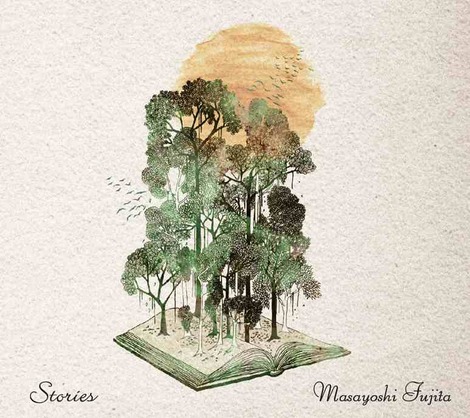When Spencer Krug released his 2011 album Organ Music Not Vibraphone Like I’d Hoped under his Moonface moniker, there was an unspoken pining from fans over what that vibraphone record might have ended up sounding like. If Organ Music or his previous Dreamland EP: Marimba and Shit-drums was anything to go by then it would have been a busy affair, with plenty of interlocking melodies playing between and over one another, reverberating into oblivion. As a fan of both of those releases, I’d be lying if I said that the description of Masayoshi Fujita’s new album didn’t intrigue me: in a nutshell Stories is a solo vibraphone album.
But a comparison to Moonface’s frantic looping and energetic builds is a bit hopeful. Fujita favours slow, open spaces much more, allowing a few simple melodies to speak for themselves. Opening track “Deers” is probably the closest thing you’ll get to something from Krug, with pleasant, memorable melodies hopping gently over one another, much like the titular animals. But like the album title, Stories, suggests, and similar to the Canadian’s work, there is still a story to tell, and each track builds its own little world, evoking natural, serene imagery. “Snow Storm” rings out over the notes being played and it’s easy to imagine being caught in an unexpected flurry of snow, before the track pauses briefly and it sounds instead like a wintry scene being watched from inside.
Each track sounds much like its title, which may or may not be down to the image being put in our head before you hear the music. “Cloud,” for example, lulls a little aimlessly, like something Kyle Bobby Dunn might make during an organic recording session, and the bowed keys of vibraphone create a really lovely sound, but part of the reason I feel inclined to compliment it is because it sounds much like you imagine a cloud would. “River” also has the same kind of problem, though its sonic effects help add an extra layer of detail worth listening out for (Fujita covered the keys on his vibraphone with tin foil, making them sound like a fizzing drum machine at work). It’s river-like in the sense that it’s easy to imagine a stream of flowing water passing by your ears, but had it been called “Flock of Birds” or “Lively Zephyr” it would still fit the bill, and you could imagine a sweeping mass of birds gliding and swooping about the sky, or refreshing breezes of wind against a tranquil, sunny scene.
What I find surprising is that Fujita doesn’t make use of the timbre of the vibrating keys more often. The decaying sound of a vibraphone is one of the most settling, wonderful things you’ll hear if you get the chance, and with mastering on Stories being done by Nils Frahm, I half expected to be able to hear the room as well as the instrument more often. Closing track “Memories of the Wind” is peaceful in the way you might expect from the title, but each careful chord and note doesn’t resonate as poignantly as it seems to want to. It’s on the eleven-minute album centrepiece “Story of Waterfall I. & II.” that we hear the pulsating effects of the keys, but unfortunately, it turns up dull and meandering. It’s ambient and calming (unlike the title might not suggest!) and it’s very easy to have it on as background music, but it never becomes absorbing or involving.
There are additional instruments here that come in the form of regal string arrangements and are a welcome surplus to the sound of the vibraphone, but when they do crop up on “Story of Forest” and “River” they tend to put the main instrument in the background and take the spotlight. Elsewhere it’s worth listening out for those aforementioned sonic details, like the sound of beads interacting with the vibraphone, the sound of the beaters hitting the keys, the background screeching on “Swan and Morning Dews,” or just Fujita shuffling about as he’s playing. Perhaps the reason Stories is a little disappointing is because I expected something else (i.e Krug at the keys). It’s pretty for all it is, but it doesn’t draw me back again and again. It’s vibraphone music, sure, just not vibraphone music like I’d hoped.

